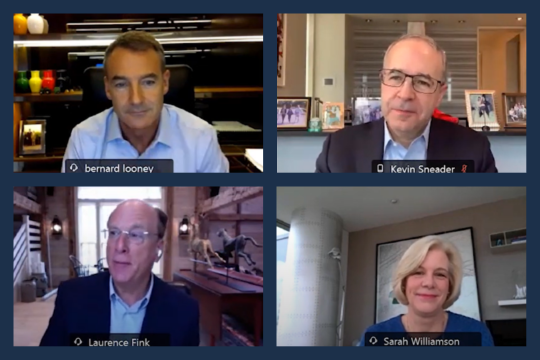
Larry Fink, Bernard Looney, and Kevin Sneader discuss a global transition to more sustainable business models

Larry Fink, Bernard Looney, and Kevin Sneader discuss a global transition to more sustainable business models
On 6 November, FCLTGlobal and McKinsey & Company co-hosted Investing in the Sustainable Energy Transition, the first of five panels to discuss how best to prepare the global business community for a more sustainable future. Larry Fink of BlackRock, Bernard Looney of bp, and Kevin Sneader of McKinsey joined the discussion to share their views on ways in which carbon intensive industries can consider transformative change. The discussion covered topics including data and transparency, the role of post-pandemic stimulus, and enabling change at scale climate-forward initiatives. Sarah Keohane Williamson, FCLTGlobal’s CEO, moderated the discussion.
“Factoring sustainability into business models is no longer a hypothetical – it is a requirement for any long-term organization. The trajectory of climate change will depend greatly on the actions taken by the global business community in the coming years,” said Williamson to kick off the hour.
The panel considered how their organizations are planning to manage the duality of short and long-term needs, specifically as they are themselves making the shift to more sustainable practices, and how the dynamic between companies and their investors can strengthen resolve to tackle climate change.
“We want to become a leaner, more diverse, and, importantly, a lower-carbon company, and one that’s focused, in creating long-term value for all of our stakeholders,” Looney said. “We started by listening—in dialogue with investors, with employees, with NGOs, with academia, with customers–and I think we came away with the inescapable conclusion that we needed to change as a company for two reasons. First, the world wants energy that is affordable and reliable, but, increasingly, it wants cleaner energy. […] And secondly, our shareholders clearly want value, and I’m a firm believer that trillions of dollars are going to get invested in rewiring the Earth’s energy system over the next several decades.”
Fink framed the discussion in BlackRock’s multi-stakeholder outlook, and said the company is taking a longer view with regard to how it approaches sustainability projects. “[This transformation] is about the long term, and it’s about helping companies move forward, preserving their business as they evolve their businesses. And I do believe customers, consumers, shareholders are all judging the companies more and more. […] I believe that this reallocation of capital is really happening. For BlackRock, this is a journey, this is not a sprint.”
Corporations in carbon-intensive industries often lack focus in the realm of sustainable energy. The panelists agreed that data and transparency may help such companies clarify their decision-making when on the verge of changing course. Looney stressed the importance bp places on transparency when building investor support for long-term planning and sustainability-focused initiatives.
“Transparency is the currency for trust, and this is what we need to do. We need to get on now, execute the strategy we’ve laid out, be transparent with it, so that people can see we’re actually doing what we said, and I have no doubt that in time investors will be more and more convinced that this is something worthwhile, and that can create value while being the right thing for the world,” Looney said.
Fink added, “We are asking every company to educate us on your long-term strategy. We’re asking every company to assure us that you reviewed your long-term strategy with your board of directors. So not only are we holding companies’ management to this long-term strategy, but the companies’ board.”
“Transparency is increasingly arising from a reporting point of view, but let’s not forget that physical risks and the transitions risks themselves have added impetus to those like Bernard, who are making the decision to embark on this journey and need to accelerate the path they’ve chosen,” said Sneader. “Physical climate risks are much more evident. And I think viscerally people therefore get it. At the same time, the recognition that, for example, certain classes of assets hold a lot of the transition risk also increases the awareness and perhaps the sense of urgency to make progress.”
The panelists also discussed how the global pandemic and the associated economic impacts have influenced corporate, investor, and government climate action, and the role of global stimulus measures in accelerating or decelerating the energy transition. When polled, 68% of the audience responded that their impression is that the COVID-19 crisis and stimulus packages would accelerate the energy transition.
Sneader added, “From a governmental point of view, there are obviously several forces at work. So the question is: how do governments face funding shortages, bankruptcies and a very difficult environment? I believe governments will recognize the ability to marry the economic benefits of this transition.”
Looney added, “[Acceleration] won’t just come from a financial stimulus, it will come from what society is asking for. I do believe it will accelerate, I think we should take that as some benefit from what the world is experiencing right now, and our job is to make the most of it and give the world what it needs, while at the same time giving shareholders the value creation that they need.”
Fink contended that government is much more short-term oriented and the pandemic has exacerbated that stance. “The pressures of governmental leaders are intense now because of COVID-19. Capital users can maybe see beyond that, but when you have the pressures of job loss, when you have the pressures of income inequality, when you have all these pressures that are associated with COVID-19, that disjointed economy creates a different focus on government and government policy. How do we make capitalism more inclusive?”
To drive, system-wide change at scale, the panel discussed the role of critical enablers, such as capital, policy and technology.
Fink discussed the importance of all three in scaling the energy transition: “It has to be done in conjunction of all three facets, it has to be done together. And this is why policy is still very, very important. The inconsistency of global policy is one of the greatest reasons for a slow implementation.”
Sneader highlighted the role of technology: “The technologies are more readily available now than one might think. And that those that are further out, we are moving them faster up the technology curve than people expected. When you put that all together, the economic case is becoming increasingly compelling for societal and other ethical implications, which are, I find, convincing. But many others with a harder nose don’t. But the reality is the tradeoffs are fewer and fewer, the reality is getting closer, and we have plenty of ways to get going. ”
Looney concluded, “If companies like ours, aren’t driving their absolute emissions down then that’s not going to help the world. At the end of the day absolute emissions need to come down. Secondly, transition companies and transition entities are hugely important, unless we transition, I think the world is going to have a challenge. And from a value creation standpoint, because of where we are today, we’re also hugely undervalued, potentially, and therefore creates an enormous value opportunity for investors.”
The McKinsey-FCLTGlobal series on “Investing in the Sustainable Transition” will continue by exploring other sectors that will be crucial to this transition, including Food & Agriculture, Mobility, Infrastructure and Technology. More details about future events will be made available soon. We welcome your perspectives on this and other topics – to contact us, email [email protected].

Governance | Article
1 June 2020 - FCLTGlobal hosted virtual roundtable discussions for Members to discuss how to effectively manage their organizations in the face of the global coronavirus pandemic. The current situation has accelerated the arrival and impact of many long-term trends and tested the resilience of all organizations.

Risk and Resilience | Article, Video
24 August 2020 - A panel of global investors discusses market recovery and planning for volatility.

Climate | Video
6 November 2020 - On Friday 6 November, FCLTGlobal and McKinsey & Company hosted the first panel in our virtual event series, "Investing in the Sustainable Transition." Larry Fink (BlackRock), Bernard Looney (bp), Kevin Sneader (McKinsey), and Sarah Williamson (FCLTGlobal) discussed the progress and outlook for sustainability within the global energy sector.